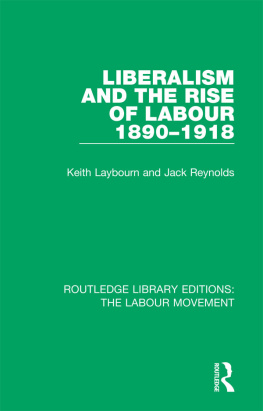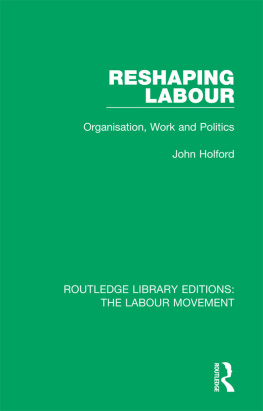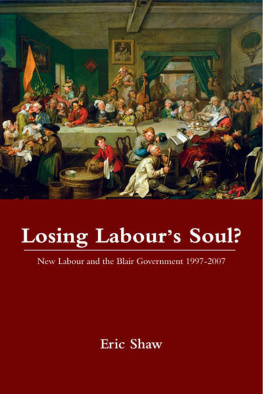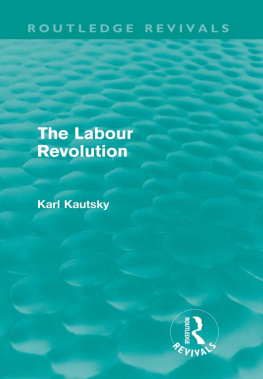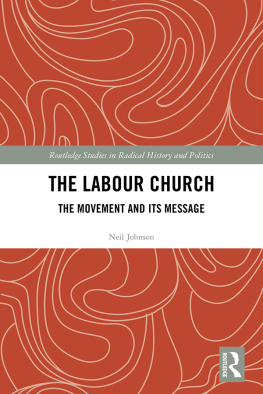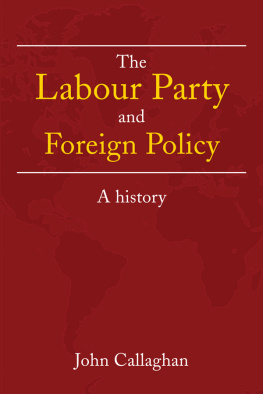ROUTLEDGE LIBRARY EDITIONS:
THE LABOUR MOVEMENT
Volume 32
THE CHANGING
LABOUR PARTY
THE CHANGING
LABOUR PARTY
Edited by
MARTIN J. SMITH AND JOANNA SPEAR
First published in 1992 by Routledge
This edition first published in 2019
by Routledge
2 Park Square, Milton Park, Abingdon, Oxon OX14 4RN
and by Routledge
711 Third Avenue, New York, NY 10017
Routledge is an imprint of the Taylor & Francis Group, an informa business
1992 Martin J. Smith and Joanna Spear
All rights reserved. No part of this book may be reprinted or reproduced or utilised in any form or by any electronic, mechanical, or other means, now known or hereafter invented, including photocopying and recording, or in any information storage or retrieval system, without permission in writing from the publishers.
Trademark notice: Product or corporate names may be trademarks or registered trademarks, and are used only for identification and explanation without intent to infringe.
British Library Cataloguing in Publication Data
A catalogue record for this book is available from the British Library
ISBN: 9781138324350 (Set)
ISBN: 9780429434433 (Set) (ebk)
ISBN: 9781138328648 (Volume 32) (hbk)
ISBN: 9780429448485 (Volume 32) (ebk)
Publishers Note
The publisher has gone to great lengths to ensure the quality of this reprint but points out that some imperfections in the original copies may be apparent.
Disclaimer
The publisher has made every effort to trace copyright holders and would welcome correspondence from those they have been unable to trace.
The changing
Labour Party
Edited by
Martin J. Smith and Joanna Spear
London and New York
Contents
First published in 1992
by Routledge
11 New Fetter Lane, London EC4P 4EE
Simultaneously published in the USA and Canada
by Routledge
a division of Routledge, Chapman and Hall, Inc.
29 West 35th Street, New York, NY 10001
1992 Martin J. Smith and Joanna Spear
Typeset in Times Roman by
Falcon Typographic Art Ltd, Fife, Scotland
Printed and bound in Great Britain by
Biddies Ltd, Guildford and Kings Lynn
All rights reserved. No part of this book may be reprinted or reproduced or utilized in any form or by any electronic, mechanical, or other means, now known or hereafter invented, including photocopying and recording, or in any information storage or retrieval system, without permission in writing from the publishers.
British Library Cataloguing in Publication Data
A catalogue record for this book is available from the British Library.
ISBN 0415078334 (hb)
0415078342 (pbk)
Library of Congress Cataloging in Publication Data
has been applied for.
This book was conceived of in the summer of 1990 with the bulk of the chapters being completed in the spring of 1991. In the course of preparation of the book the Department of Politics, University of Sheffield hosted a series of seminars on the theme of Labours Policy Review. This provided an opportunity for several of the contributors to present papers and get feedback. The editors would like to thank the academics and graduate students who took part in the programme for their ideas and enthusiasm. A further series of papers were presented at the Political Studies Association 1991 Conference at Lancaster University. Again the editors would like to thank all those who attended the panel for their input.
The editors would also like to express their thanks to Pat Gordon Smith of HarperCollins for her initial help and support in getting the book underway and to Gordon Smith of Routledge for seeing the project through to fruition.
Martin Smith and Joanna Spear
Martin J. Smith
The 1980s have seen substantial changes in the Labour Party both in terms of policy and organization. To a large extent the 1980s was, for Labour, the lost decade. It was a period of intense internal fighting, electoral humiliation and even, with the rise of the Social Democratic Party, threats to its very existence. However, the 1990s has seen a reinvigorated Labour Party which appears, for the moment, to have overcome its apparently fundamental divisions, and as Seyd and Whitely show in chapter 3, reorganized its structure. There have also been, partly as a result of the Policy Review, major changes in Labour Party policy. This book will assess the nature of these changes. It will examine how much policy has changed, why it has changed and what the impact of this change might be on a Labour Government. This chapter will first provide a brief overview of the key events within the Labour Party during the 1980s.
THE LABOUR PARTY IN THE 1980s: THE RISE OF THE LEFT
The final years of the last Labour Government were a period of economic and political crisis. The Party came to power in February 1974 with a radical manifesto committed to greater public expenditure, increased intervention in the economy, an expansion of welfare services and a radical redistribution of wealth. These policies were never implemented. This failure was due to a lack of commitment by the leadership, the absence of a parliamentary majority and the severe economic crisis which dogged Labour almost throughout its five years in power. As early as 1975 the Chancellor of the Exchequer, Denis Healey, demanded 3 billion worth of cuts in public expenditure. By 1977 the severity of the economic crisis had forced the Government to ask the International Monetary Fund for a loan which resulted in further substantial cuts in expenditure and revisions of policy (see Coates 1980).
The public expenditure cuts combined with economic crisis created increased dissatisfaction within both the party and the trade union movement. The Government attempted to deal with inflation through incomes policies of increasing severity which tested to breaking point the support of trade union leaders. In the autumn of 1978 unions demonstrated their unhappiness by voting against pay policy at the TUC conference. A number of strikes in the public and private sectors culminated in the Winter of Discontent. With lorry drivers, hospital porters, refuse collectors and even grave diggers on strike, the country appeared to be in a state of chaos where the unions rather than the Government were in control. The series of strikes undermined the Governments economic strategy, the view that only it could work with the unions, and eroded much of its authority. It seemed that the party leadership was strategically and ideologically bankrupt. By cutting public expenditure, abandoning full employment, deflating the economy and pursuing monetarism, the leadership had explicitly abandoned Keynesian social democracy and seemed to have little idea, apart from financial orthodoxy, of how to resolve Britains crises.
There was, as a consequence, an increasing divergence between the views of the party leadership and those of its active members. A largely left-wing membership became disillusioned with a Government lacking in direction and apparently challenging its supporters in the unions and the Party rather than its opponents in the city (Whiteley 1983). The strength of the left of the Party had been developing throughout the 1970s due to: the increasing dissatisfaction with Labour in power; changes in Labour Party membership and union leadership; and the development of left-wing organizations within the Party (Seyd 1987). The combination of an influx of young, radical and middle-class members with the election of a number of left-wing union leaders, enabled the left to become increasingly strong within the key policy-making bodies, the NEC and the conference. It was then able to ensure the adoption of many of its favoured policies.


